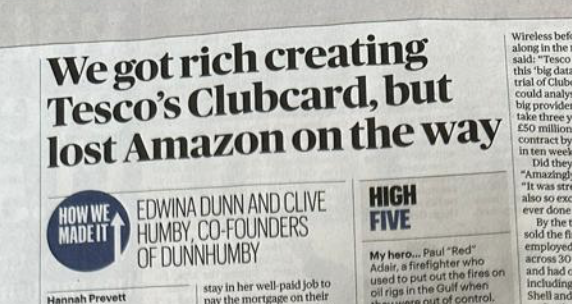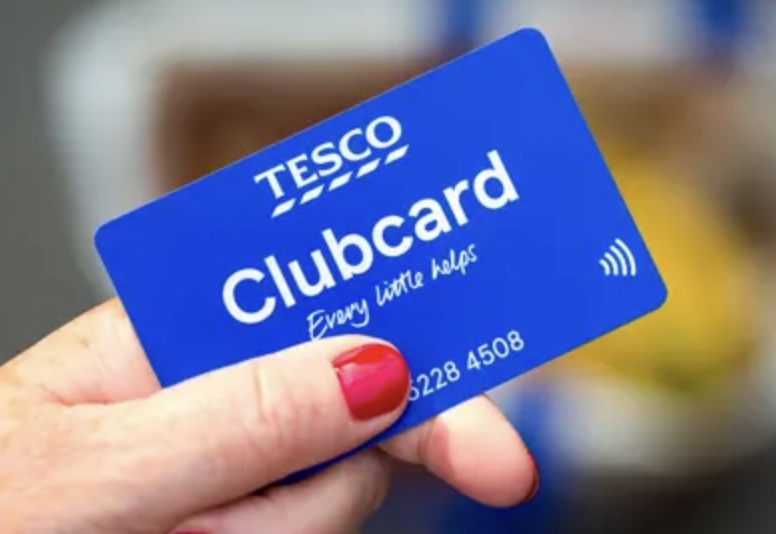 Edwina Dunn and Clive Humby had been running their consumer data company, Dunnhumby, for a decade when Tesco, a shareholder and its most high-profile customer, waged war with another of its clients – Amazon.
Edwina Dunn and Clive Humby had been running their consumer data company, Dunnhumby, for a decade when Tesco, a shareholder and its most high-profile customer, waged war with another of its clients – Amazon.
As Dunn recalled: “Tesco made a big public statement saying they were going to take Amazon’s market in books. Dunn’s contact at Amazon responded to it. “They said: ‘If that’s Tesco’s vision and mission, we can’t work with Dunnhumby anymore?'” Amazon walked. It was, the 65-year-old said, “upsetting” to say the least. But there was never any doubt where Dunnhumby’s loyalties would lie.
So successful was the Clubcard for Tesco that Dunnhumby was approached to do the same for Kroger, the US chain. Tesco liked its work so much, it bought a 53 per cent stake for £30 million in 2001, buying the rest in 2010. Dunn and Humby left a year later, having banked a reported £92 million. By then, the business was making profits of £46 million on a £248 million turnover. Dunn, from southwest London, studied geography at Bournemouth University.
She then hit her stride after landing a job at CACI, a US software consultancy, where she specialized in helping retailers figure out what kind of customers lived within a quarter mile radius of stores. Dunn climbed the ladder quickly and became CACI’s youngest female vice-president. She met Humby, a mathematician, on her first day and they married about 18 months later.
But after nine years at CACI, the couple grew frustrated at the lack of appetite for new technology. They came up with a plan. Humby would leave his job at CACI and start their own tech business helping retailers analyze demand. Dunn would stay in her well-paid job to pay the mortgage on their new home in west London and then join him later. But “ten minutes” after Humby handed in his resignation, Dunn was fired. CACI, it seems, did not like the idea of having a manager whose husband worked for a rival.
After they signed up their first client – Booker cash-and-carry – CACI pursued them in court for using “confidential knowledge.” The couple won in the High Court and set up a data business, with Humby running the technology side and Dunn working on sales and strategy. Humby described how they hit upon the idea: “Everyone was throwing away customer data at this time because it was too expensive to hold it. Our idea was, ‘wouldn’t it be useful if you kept your data?’ They wrote a business plan and started approaching potential investors. A former CACI colleague, Geoff Squire, invested £250,000 and said, ‘You tell me how much equity that buys me.’ They all agreed on 30 per cent.
They worked with clients including BMW and Cable & Wireless before Tesco came along in the mid-1990s. Dunn said: ‘Tesco was looking at this ‘big data’ from an early trial of Clubcard, but no one could analyze the results. The big providers said it would take three years and cost £50 million.’ They won the contract by promising to do it in ten weeks for £250,000. Did they pull it off? ‘Amazingly, yes,’ said Dunn. ‘It was stressful but it was also so exciting. No one had ever done it before.’
By the time Dunnhumby sold the final stake to Tesco, it employed 1,300 people across 30 offices worldwide and had other clients including Cadbury, Vodafone, Shell, and Unilever.
Casting around for their next adventure, they came across a small business called Starcount, which had been set up to analyze social media data to predict the future buying habits of consumers. Unfortunately, it did not prove plain sailing. The social media sites twigged the value of their data and started charging ‘huge fees’ to license it. Then Covid hit.
Dunn admitted: ‘You can fall for the idea that because you were successful once, it is going to be easier the second time round. And it isn’t.’ Her daughter, Rowena, 32, is now in the driving seat at Starcount. Meanwhile, Dunn is running The Female Lead, an initiative to provide more accessible role models for young girls. She has written several books, including When She’s in the Room, which offers ‘practical solutions to workplace inequalities’. It will hit the bookshelves in March.
She relishes being busy. ‘I can’t just say, “Oh, I’m a bit older – I’ll just do the gardening. I can’t do it.'”
About Edwina Dunn
Edwina Dunn is a pioneering and successful leader in the data industry, known for delivering transformative business change.
She co-founded dunnhumby, which revolutionized the retail and consumer goods industry by pioneering Tesco Clubcard and other global loyalty programs. Her vision and work transformed the way retailers used customer data to drive their businesses, providing insights that had previously been unimaginable.
The success of dunnhumby has been replicated worldwide, becoming the industry standard for customer insights. Its strategic importance was underlined when it was acquired by Tesco in 2011.
Edwina has served on a number of government boards including HMRC (NED), The Geospatial Commission (Commissioner) and The Centre for Data Ethics and Innovation (Chair). She also invested in a new generation of data and predictive algorithms when she became Chair of Starcount. Her pioneering work has earned her numerous accolades, including an OBE for her services to data and business in 2019, honorary doctorates from a number of universities.
Today, Edwina leads her Campaign: The Female Lead which is an active community of 8 million women, underpinned by an educational foundation, and focused on celebrating the achievements and diversity of women who shape our world. Using data to understand the challenges women face, Edwina works with businesses and the government to create new, mutually beneficial models and policies for the workplace.
